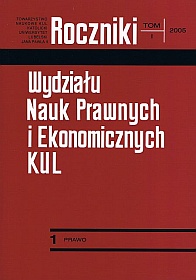Das Individuationsprinzip bei Duns Scotus (1265-1308)
Abstract
[Abstrakt tylko w j. polskim / Abstract only in Polish]
Zasada jednostkowienia u Dunsa Szkota (1265-1308)
Problematyka jednostkowienia bytu osoby ludzkiej według Dunsa Szkota stanowi bardzo ważną problematykę filozoficzną, także ważną i interesującą dla prawnika i ekonomisty z tej racji, że człowiek stanowi zarówno rację ekonomii, jak też jest podmiotem praw i obowiązków wraz z posiadaniem prawa do stanowienia porządku prawnego. Stąd znajomość antropologii jest dla prawnika warunkiem sine qua non. Chociaż temat ten powraca w refleksji filozoficznej, np. Honnefeldera, M. A. Krąpca, B. Walda, A. Schmidta, U. Zielińskiego, to warto ciągle na nowo podejmować to wyzwanie. Krótki zarys biograficzny poprzedza teoriopoznawcze stanowiska Szkota w jego relacji do stanowiska Tomasza z Akwinu, by skupić uwagę na samej zasadzie jednostkowienia, którą Skotus pojmuje jako haecceitas w samej formie substancjalnej człowieka jako bytu osobowego. Tezy Edyty Stein, Martina Heideggera oraz Ericha Przywary w tej kwestii dodatkowo ubogacają analizę tej złożonej problematyki, w dalszym ciągu aktualnej m.in. dla filozoficznego namysłu nad człowiekiem oraz nad ekonomią i polityką.
References
Aristoteles: Metaphysik XII, 1071 a, 27-29.
Aristoteles: Phys., I, 7, 191 a. 8-14.
Assenmacher J.: Die Geschichte des Individuationsprinzips in der Scholastik, in: Forschungen zur Geschichte der Philosophie und der Pädagogik, herausgegeben v. Artur Schneider u. Wilhelm Kahl, I. Band, Heft 2, 1926, 1.
Assenmacher J.: Die Geschichte des Individuationsprinzips in der Scholastik, Leipzig 1926, 64.
BöhnerPh., GilsonE.: Christliche Philosophie, 3. Auflage, Paderborn 1954, 565.
DunsScotus: II Ox.-Garcia 3, 5 et 6; II, 267, Nr. 287.
DunsScotus: II sent. Dist. III q. 5 a., Vives–Paris 1893.
DunsScotus: Oxon. II, d. 3, q. 9, n. 6.
Gilson E.: Der Geist der mittelalterlichen Philosophie, Wien 1950, Anm. 7, 223.
Gilson E.: Johannes Duns Scotus. Einführung in die Grundgedanken seiner Lehre, Düsseldorf 1959, 449.
Heidegger M.: Die Kategorien- und Bedeutungslehre des Duns Scotus, Tübingen 1916, 12, 101, 177, 190, 230.
Lexikon für Theologie und Kirche, herausgegeben v. Michael Buchberger, zweite, neubearbeitete Auflage des kirchlichen Handlexikons, 3. Band, Freiburg 1931, 489.
Meyer G.: Individuation, in: Lexikon für Theologie und Kirche, herausgegeben von J. Höfe u. K. Rahner, Bd. 5, Freiburg 1960, 658.
Przywara E.: Griechische, patristisch-scholastische und neuzeitliche Philosophie im Gottesgeheimnis der Welt, München 1923, 107.
Stein E.: Endliches und ewiges Sein. Versuch eines Aufstiegs zum Sinn des Seins, herausgegeben von L. Gelber/Romaeus Leuven, Edith Steins Werke, Band II, 3. unv. Auflage, Freiburg 1986, 497 S.
ThomasvonAquin: In VIII Metaph., lect. 1; ed. M.-R. Cathala, n. 1687.
Copyright (c) 2005 Roczniki Wydziału Nauk Prawnych i Ekonomicznych KUL

This work is licensed under a Creative Commons Attribution-NonCommercial-NoDerivatives 4.0 International License.

